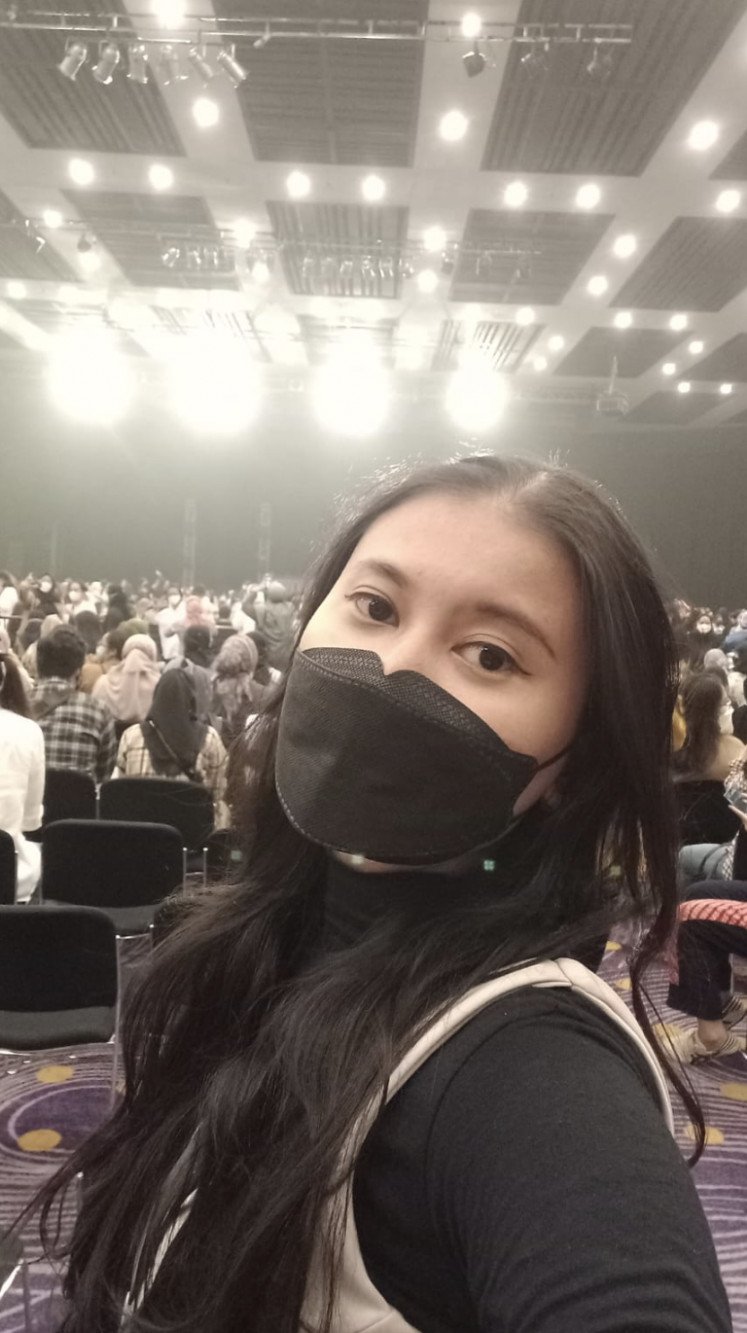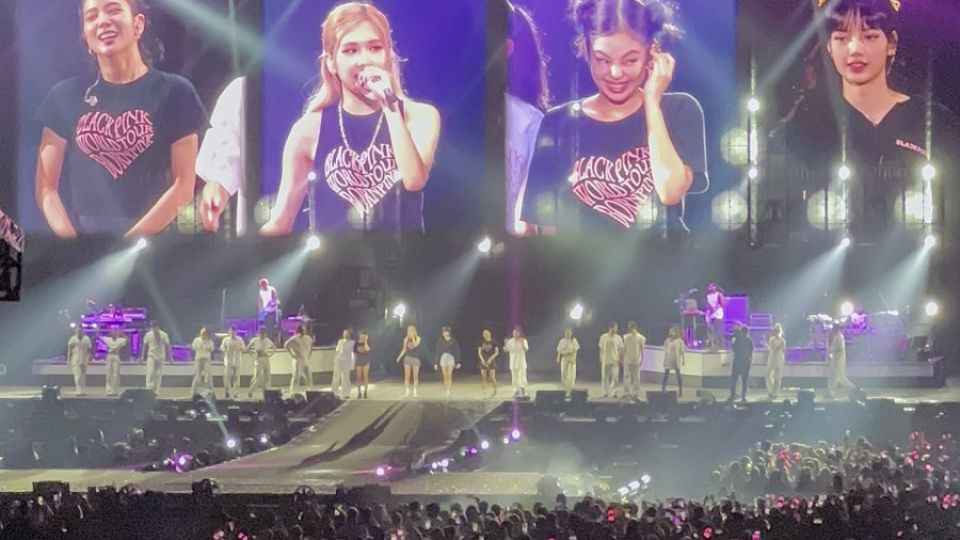March 22, 2023
JAKARTA – Some Indonesian political parties are including K-Pop-inspired social media and events in their campaigns, yet the reception is divided.
Recently, political parties have been on social media about giving away tickets to Blackpink’s BORN PINK tour.
The Indonesian Solidarity Party (PSI) tweeted on its Twitter account that it would give away tickets to the Blackpink performance on March 4. Winners were randomly selected from those who followed the political party’s Twitter account and reposted the giveaway post.
Gerindra announced a ticket giveaway to see Blackpink on its BORN PINK world tour in Jakarta on its Twitter account on March 8. To win the giveaway, fans had to pose with a photo of themselves in front of a billboard featuring the face of Prabowo Subianto while wearing Blackpink merchandise. Tagging Gerindra and Prabowo on social media were also required. The tweets have been shared thousands of times, gaining over a million views.
Indonesia’s number of K-Pop fans is staggering. In 2020, The Jakarta Post reported that Indonesians were the third-most devoted K-stans worldwide.
In 2022, the National Mandate Party (PAN) held an event called Birukan Langit Indonesia (Blueing the Indonesian sky) in Istora Senayan Jakarta, featuring the rising K-Pop group Astro, along with other Indonesian artists such as Tiara Andini, Brisia Jodie, Ungu, Kangen Band, Maliq & D’Essentials and many others. The gathering was part of the PAN annual national working meeting (Rakernas).
Zita Anjani, a member of the PAN’s central executive board (DPP), stated that the party’s intention in hosting the Birukan Langit Indonesia event was to attract the support of young voters in advance of the 2024 general election.
“It is time for political parties to stop talking about narratives and start referring to the voices of the youth,” Zita reported in Suara.
What effect, if any, does this have on the political leanings of the millennial generation?
Divided reaction
Supporters’ reactions are divided about the political parties’ tweets offering free tickets.
An account with the username @Blink_OFCINDO, dedicated to Blackpink, wrote, “Hello, @Gerindra; please take down this post. We ask you not to bring Blackpink’s name to your political interests. Thank you”.
To which Gerindra’s Twitter admin replied: “Hello there. Good afternoon. There’s no political interest whatsoever. There is also no suggestion or direction to choose this or that. If anyone interprets it in such a way, we shall return it to their own perspective. Thank you”.
The Blackpink fan account is not the only one that was not impressed with political parties posting about K-Pop. Ines Sela Melia, a 22-year-old final-year journalism student living in Jakarta, said she disagreed with political parties injecting K-Pop nuance into Indonesian politics, considering Indonesia has a different culture from South Korea.
She told the Post that she would not let the presence of a K-pop idol at an event or the distribution of free tickets influence her vote in the upcoming election because neither of those activities addressed the country’s problems. But she appreciated the originality of including K-pop in the political sphere.

South Korean girl band Blackpink performs during their concert Blackpink BORN PINK at Gelora Bung Karno sports complex in Senayan, Central Jakarta, on March 11. On the first day of the concert, Blackpink performed several hits including “Pink Venom“, “How You Like That“ and “Kill This Love“. (Antara/Rianti)
“Considering how popular K-pop has been recently, it’s easy to see how they [political parties] could have enticed new voters [this way],” she said.
In the upcoming 2024 presidential election, millennials and Gen-Z are projected to comprise 60 percent of the voting population, per a study by think tank the Centre for Strategic and International Studies (CSIS) written by Arya Fernandes, Edbert Gani Suryahudaya and Noory Okthariza.
Journalist student Ines further asserted that as a millennial, she was interested in the environmental issues surrounding the country and she had been looking for political figures who were more “relatable” and “humble” for millennials.
“I don’t care about the entertainment stuff. I see there are still millennials who could relate more with politicians who often do blusukan [impromptu visits]. It’s better when they genuinely intend to do that, especially to engage with the community,” Ines said.
Meanwhile, 23-year-old Putri Fahira Budiman added that involving K-poppers made political parties look “desperate” for more voters and followers from the younger audience.
“I know it’s one of the political parties’ efforts to gain a mass [base], to win in elections,” the Jakarta-based make-up artist, who is also a fan of South Korean boyband NCT, said. She claimed to have joined a giveaway for a beauty product hosted by strictly entertainment accounts. She wouldn’t, however, participate in giveaways, including for K-Pop-related prizes, from political parties because it sounded like supporting a “personal interest” of the parties.
Ines explained she would not change her opinion of a particular political party during the election due to K-pop “branding” by these parties. She added that political parties should focus more on teaching the populace, for instance, by stressing the value of paying taxes rather than handing out free tickets.
“Public education might also be a strategy for attracting younger audiences. There are issues in real life that they could address more seriously than just giving away the free tickets,” she said.
Moreover, the CSIS research paper reported that 34.8 percent of respondents (from a total of 1200 respondents) demanded honest or anticorruption leaders, with growing awareness among today’s youth of corruption’s pervasiveness and the urgency of taking action to combat it.
Yet others viewed political parties involving K-Pop as a regular approach. Twitter user @apraenple questioned, “Why is it flawed? As Blackpink is well-known, it’s common for people to offer free tickets while promoting themselves. Some companies provide free food, beverage, beauty, and retail tickets. It is [the exception] and is not permitted since it is a political party”.
Comments by Uby, a 29-year-old psychology graduate who goes by a pseudonym online, echoed those of @apraenple, stating that it was nothing out of the ordinary for political parties to ride waves similar to the one created by K-Pop, seeing that, “there’s no harm in giving free tickets.”
Furthermore, he argued that some K-Pop fans had voiced their political views. He took an example of fans disrupting Donald Trump’s campaign and illustrated how everyone in a democratic country has a different opinion.
Although K-pop is not always political, K-pop fans have effectively organized for political causes. K-pop fans in 2020 took credit for driving up ticket demand for Trump’s event in Oklahoma, and then not turning up.
Moreover, Uby admitted he was enjoying the engagement of the parties on social media.
“While everyone has reasons for voting a certain way, it’s interesting to see how political parties like Gerindra utilize social media. I didn’t find any particular cringe-worthy posts,” Uby said.
The Post asked PSI’s DPP spokeswoman, Zebi Magnolia, whether the organization hoped to win over a younger audience by giving away free tickets to the Blackpink concert, she replied, “PSI has no intention of politicizing K-Pop or [using it to] promote PSI as a political party.”
In fact, Zebi said, the idea of giving away free tickets came from the K-pop community members of the PSI itself. She further shared that Blackpink’s trip to Indonesia could increase fandom and solidarity.

Disagree: K-pop fan Ines Sela Melia disagreed with the idea that political parties in Indonesia should use K-pop tactics like giving away concert tickets to get voters (Courtesy of Sela Melia) (Archive/Courtesy of Sela Melia)
Furthermore, Zebi emphasized the importance of enabling less fortunate K-pop fans to fulfill their dreams of seeing their idols live by providing financial assistance to purchase concert tickets.
The 22-year-old former idol declined to speak at length about the party’s youth engagement strategy for 2024, suggesting, “Just wait for it. Our program is inspired by the dynamic cycle of humans.”
More than social media
Beltsazar Krisetya, a digital politics expert and chief researcher at CSIS Indonesia’s Safer Internet Lab (SAIL), said that politicians frequently used such strategies to rally support for important causes among the country’s young voters.
Beltsazar predicted that “youth voters will represent the majority in the next election [at least 60 percent],” highlighting that addressing the concerns and appealing to the interests of young people was a means of electoral success.
Beltsazar stated that politicians were trying to foster homophilic environments to recruit more people from similar backgrounds. As such, politicians were trying to appeal to a specific subset of voters by focusing on millennials.
Furthermore, he said, there was a widespread belief among Indonesians that young people were more interested in certain politicians rather than in any particular ideology or political party. As he put it, those excited or trying to appear approachable, ordinary or grounded would stand out.
“Young voters’ engagement on social media is at its peak […] Thus, the impact of social media on the election will be deeper. One crucial finding of the CSIS research noted that those more engaged on social media tended to share more regularly about progressive issues such as climate change,” Beltsazar said.
CSIS found that 38.6 percent of young people who used social media had a better understanding of climate issues than those who relies on traditional media (15.2 percent).
“Certainly, having a good social media presence is not enough. What is needed by the youths is trust in the democratic institution and agents,” Beltsazar said.
Arya Fernandes, head of politics and social change at CSIS in Jakarta, specializing in electoral and party politics, perceived millennials as having developed a more critical outlook.
“They [millennials] are capable of seeing what kind of competencies candidates [have],” Arya said.
Arya showed that money politics could only be effective in a specific area. Genuineness could be built when the giver had a strong patron with matters intended for the receiver.
“This time, the people’s choice for leader is not exactly the same as the one they [previously] had in mind. In 2019, followers would look up to leaders who are easier to talk to. My research in 2022, however, suggests that people value honesty and open discussion of anticorruption problems more highly than they did in the past,” Arya said.
“The challenges they face are different now. That’s why young people do care about more essential things such as health and social reforms as in the newly passed Criminal Code (KUHP) that was just enacted,”
“The public is still drawn to approachable leaders, but the characteristics are no longer the primary criteria,” Arya closed.


